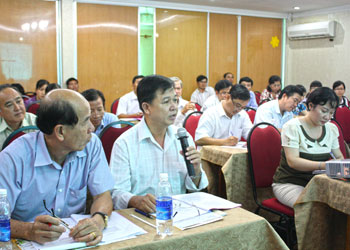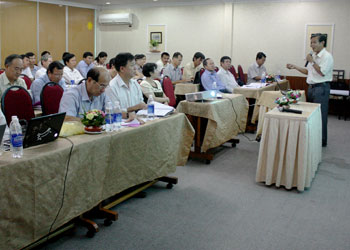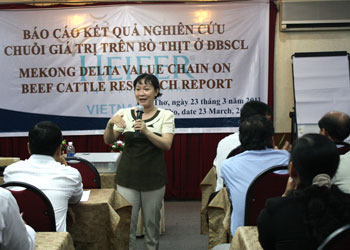Story and Photos by Nguyen Xuan Quyen | Communication and Networking Officer | Heifer Vietnam
 On March 23, 2013, Heifer Vietnam hosted 35 project partners and four members of Heifer Vietnam's advisory committee for a workshop titled "Mekong Delta Value Chain on Beef Cattle Research Report." During the event, Nguyen Ngoc De, head of the advisory committee for Heifer Vietnam, presented his research on the subject.
On March 23, 2013, Heifer Vietnam hosted 35 project partners and four members of Heifer Vietnam's advisory committee for a workshop titled "Mekong Delta Value Chain on Beef Cattle Research Report." During the event, Nguyen Ngoc De, head of the advisory committee for Heifer Vietnam, presented his research on the subject.
The most important problem in beef cattle development in the Mekong Delta is not production, but the beef market. This study on the beef value chain was essential to identify problems and constraints and then propose a systematic intervention package for sustainable development of the beef sector, as well as strengthen the effectiveness and efficiency of future supporting projects. The target areas in this study were An Giang–a province that borders Cambodia and the upper stream of the Mekong Delta River, Vinh Long–a central province and the beef distribution center, and Ben Tre–a coastal province with the largest beef cattle herd in the country (reportedly 157,000 heads, or 23.64 percent of the country's total, in 2011). The study of these three provinces had 353 stakeholders, consisting of small farmers (Heifer participants and non-Heifer participants), farm owners, collectors, slaughterers, retailers, wholesalers and consumers.
 According to the study, Vietnam’s total national meat production in 2011 only met approximately 54 percent of the domestic market demand. Beef production in the area studied accounted for only seven percent of the country’s production, while the supply in the Mekong Delta meets 15.8 percent of the area’s demand. Therefore, there is great opportunity for beef cattle production in the Mekong Delta, specifically, and the whole country of Vietnam, in general.
According to the study, Vietnam’s total national meat production in 2011 only met approximately 54 percent of the domestic market demand. Beef production in the area studied accounted for only seven percent of the country’s production, while the supply in the Mekong Delta meets 15.8 percent of the area’s demand. Therefore, there is great opportunity for beef cattle production in the Mekong Delta, specifically, and the whole country of Vietnam, in general.
At the workshop, Ngoc De presented strengths and weaknesses of beef cattle producers, collectors, slaughterers, wholesalers and retailers. He suggested upgrading strategies of the beef value chain in terms of production yield, beef quality, production organization, linkage and collaboration, value-added products and market connection. He also proposed areas for possible intervention, including devising well-organized plans for beef cattle production, breed improvement, production and processing technologies, beef quality control and management, production systems and marketing environment.
 Following Ngoc De’s report, workshop participants gave feedback and shared opinions. Mai Van Hiep, deputy director of the Department of Animal Health and a member of Heifer Vietnam's advisory committee, said, “Beef imported from Australia has the same price as the Vietnamese beef price, so this is an issue that should concern us. Heifer Vietnam should think of its future actions and work in alliance with the state’s program. Heifer Vietnam can help the farmers skip the beef collection phase and reduce the price.”
Following Ngoc De’s report, workshop participants gave feedback and shared opinions. Mai Van Hiep, deputy director of the Department of Animal Health and a member of Heifer Vietnam's advisory committee, said, “Beef imported from Australia has the same price as the Vietnamese beef price, so this is an issue that should concern us. Heifer Vietnam should think of its future actions and work in alliance with the state’s program. Heifer Vietnam can help the farmers skip the beef collection phase and reduce the price.”
The Heifer Vietnam team is using the survey results and feedback from partners to develop a mega-project to reach 50,000 small beef cattle farmers in the Mekong Delta to improve the current value chain.